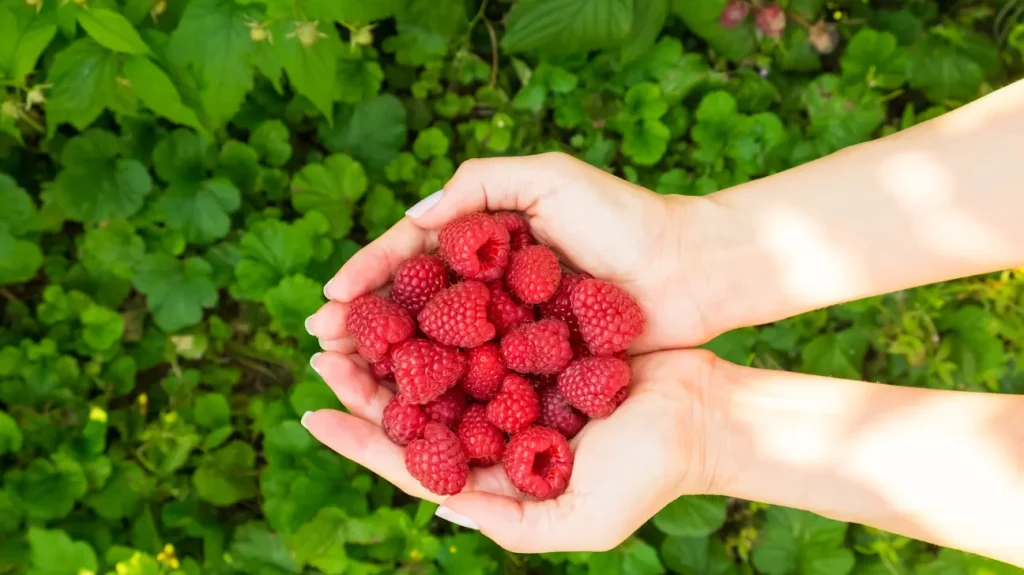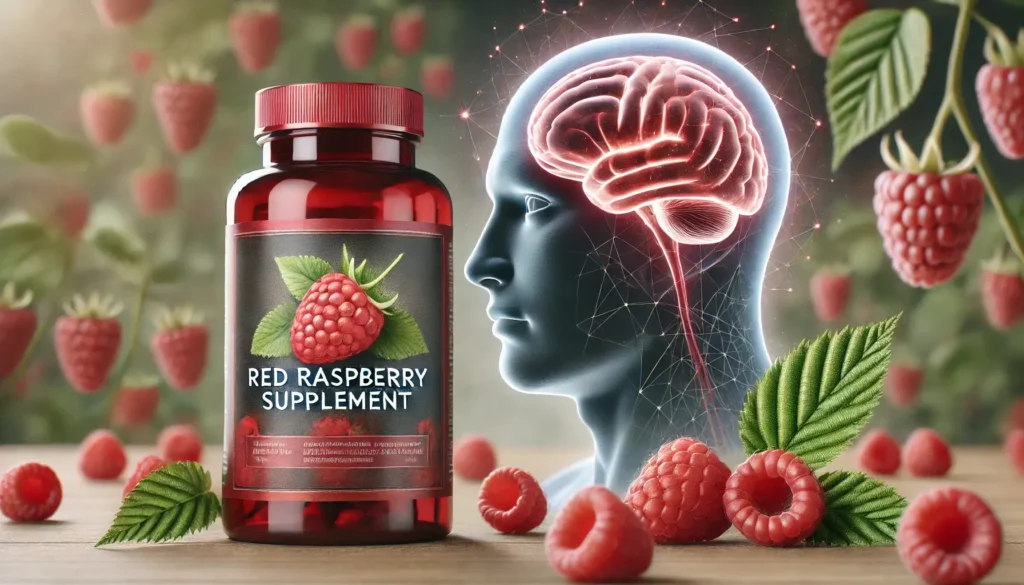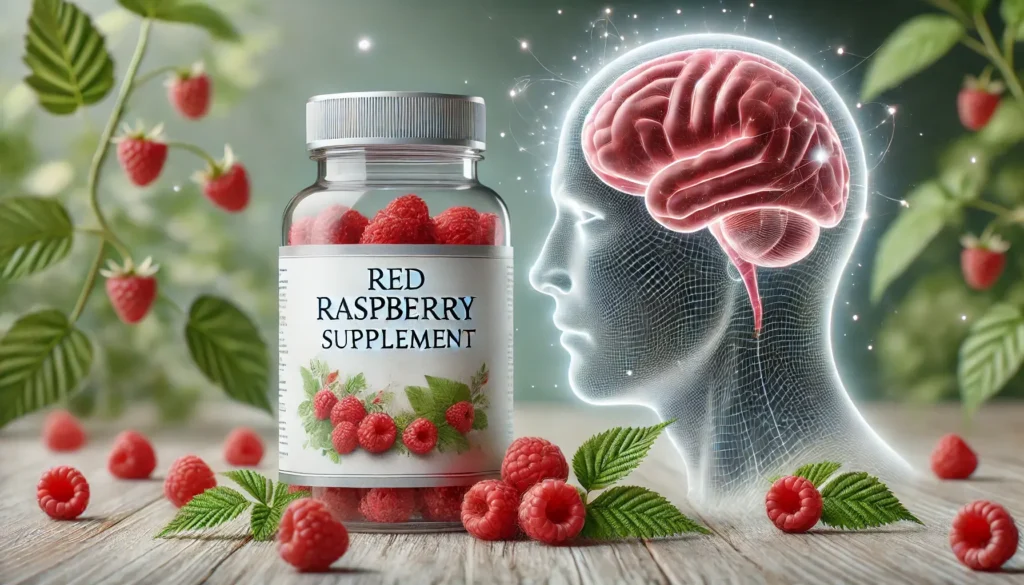Many people are aware of the medicinal as well as culinary benefits of Red Raspberry (Rubus idaeus). Red Raspberry’s nootropic qualities have drawn attention recently, especially because of its ability to improve alertness, focus, and cognitive function. This page explores the scientific basis of Red Raspberry, looking at its chemical makeup, health advantages, best dosages, adverse effects, interactions with other substances, and responsible use to enhance cognitive abilities.
You May Also Like:
Bayberry: Benefits, Dosage, Side Effects, Drug Interactions, and Other Important Information
Bilberries: Benefits, Dosage, Side Effects, Drug Interactions, and Other Important Information
Nature of Red Raspberry
Rubus idaeus is the scientific name for Red Raspberry. Red Raspberry is a perennial plant of the Rosaceae family. Originating in Europe and some areas of Asia, its widespread popularity and multipurpose applications have led to its cultivation in temperate zones around the world. The plant has complex leaves, thorny stalks with thorns, and delicate white or pink blooms. It usually reaches a height of 1.5 to 2.5 meters. The fruit, which ripens primarily in the summer, is made up of numerous tiny drupelets that are grouped around a central core, and each contain a seed. The distinctive aggregate fruit appearance of Red Raspberries is a result of this structure.
Red Raspberries are grown in different ways depending on the climate and the cultivar; certain cultivars are designed to withstand cold or to be resistant to specific pests and diseases. When it comes to picking raspberries, they are often chosen when their flavor reaches their height, and they can be readily separated from the core. Because they are perishable, they are usually eaten soon after harvest, either frozen, fresh, or processed into goods like purees, jams, and jellies.

Health Benefits of Red Raspberry
Red Raspberries offer a plethora of health benefits, making them a valuable addition to a nutritious diet. Beyond their potential cognitive enhancing effects, these berries are highly beneficial for overall health due to their high nutrient and phytochemical content.
- Antioxidant Properties: Red Raspberries are rich in antioxidants such as vitamin C, quercetin, and anthocyanins. These compounds help combat oxidative stress in the body, which is linked to various chronic diseases including cancer, diabetes, and heart disease. The antioxidants in raspberries can neutralize free radicals, thereby preventing cellular damage and promoting overall health.
- Anti-inflammatory Effects: Chronic inflammation is associated with a host of health issues, including arthritis, heart disease, and diabetes. The anti-inflammatory properties of flavonoids and ellagic acid in Red Raspberries can help reduce inflammation throughout the body, potentially lowering the risk of these conditions.
- Cardiovascular Health: The potassium and magnesium in red raspberries contribute to cardiovascular health by helping to regulate blood pressure. Additionally, the fiber and tannins found in raspberries can help reduce cholesterol levels, further protecting against heart disease.
- Cancer Prevention: Ellagic acid, a notable compound in Red Raspberries, has been studied for its cancer-fighting properties because it may help prevent skin, bladder, lung, esophagus, and breast cancers by neutralizing carcinogens and inhibiting the growth of cancer cells.
- Digestive Health: High in dietary fiber, Red Raspberries support healthy digestion by promoting regular bowel movements and preventing constipation. The fiber also feeds beneficial gut bacteria, which is essential for good gut health.
- Weight Management: Low in calories but high in fiber, Red Raspberries can help promote a feeling of fullness, reducing overall calorie intake and supporting weight management efforts.
- Diabetes Management: The fiber in Red Raspberries can help slow down the digestion of carbohydrates, which helps control blood sugar levels, making them a suitable choice for people with diabetes.

Chemistry of Red Raspberry
Red Raspberry is a chemically complex plant with a wide range of bioactive chemicals that support its various health advantages. Red Raspberries include anthocyanins, which comprise cyanidin-3-glucoside and cyanidin-3-rutinoside, as one of its main chemical groups. These substances have strong antioxidant qualities and are primarily responsible for the berry’s striking red color. Anthocyanins aid in the body’s scavenging of free radicals, shielding cells from oxidative damage.
Red Raspberries also have high concentrations of other flavonoids like quercetin, kaempferol, and catechins in addition to anthocyanins. In addition to having antioxidant qualities, these compounds support the fruit’s overall anti-inflammatory benefits. For example, quercetin is well known for its capacity to stabilize mast cells, which aids in lowering the body’s production of histamine and other inflammatory markers.
Red Raspberries have large quantities of ellagic acid, a phenolic molecule. It has been investigated for possible anti-cancer effects and is essential in neutralizing carcinogens. Additionally, Red Raspberries’ antioxidant pool is increased by ellagic acid, strengthening their ability to help fend off oxidative stress.
Tannins, which are polyphenolic chemicals with astringent qualities and the potential to promote digestive health by binding proteins and other organic molecules in the gut, are also abundant in the fruit.
Physiological Mechanism of Action
Red Raspberry’s physiological benefits on cognitive performance are mainly related to its capacity to regulate inflammation and oxidative stress, two major contributors to cognitive dysfunction and decline. Red Raspberries include anthocyanins and other flavonoids that can penetrate the blood-brain barrier and directly affect the brain’s antioxidant capacity. These substances assist in maintaining the integrity and functionality of neurons by minimizing oxidative damage to neurons and neutralizing reactive oxygen species.
Red Raspberry’s anti-inflammatory properties are also very important. Cognitive impairments and neurodegeneration can result from persistent inflammation in the brain. Red Raspberries include flavonoids and ellagic acid, which can suppress the action of some inflammatory cytokines and enzymes that are involved in inflammatory processes, like lipoxygenase and cyclooxygenase. This process promotes general neurological health by lowering inflammation throughout the body, including the brain.
Additionally, Red Raspberries contain molecules called flavonoids that inhibit acetylcholinesterase, which increases cholinergic activity by stopping the breakdown of acetylcholine, a neurotransmitter that is crucial for memory and learning. Improvements in synaptic transmission and cognitive processes including learning, memory, and attention are possible outcomes of this effect.
Furthermore, Red Raspberries might have an impact on neuroplasticity, the brain’s capacity to rearrange itself through the creation of new neural connections. The fruit’s antioxidant and anti-inflammatory qualities may have neuroprotective effects, promoting a better brain environment that supports cognitive function and resilience against neurodegenerative diseases.
Red Raspberry’s intricate chemistry and interactions with physiological circuits highlight the fruit’s potential as a cognitive enhancer. Red raspberries have the potential to improve brain health and cognitive abilities through processes including antioxidant activity, anti-inflammatory effects, and neurotransmitter system regulation.

Optimal Dosage of Red Raspberry
When calculating the best dosage for cognitive benefits, it’s important for you to take into account the type of Red Raspberry that is ingested, such as juice, fresh fruit, or supplements like powders or extracts. A daily consumption of roughly 1-2 cups of fresh berries, or an equivalent form, looks to be healthy, according to studies on general health benefits. However, there is a dearth of research especially focusing on dose for cognitive enhancement. Please adhere to product guidelines and seek advice from healthcare professionals while using concentrated extracts.
Side Effects of Red Raspberry
In general, Red Raspberry is regarded as safe for most individuals when taken in dietary quantities. When ingested in significant numbers, the high tannin concentration can potentially cause gastrointestinal issues. Although uncommon, allergic responses can occur. People should pay close attention to how their bodies react to Red Raspberry, particularly if they take it as an extract.
Potential Substance Interactions
Red Raspberry supplements and pharmaceuticals do not seem to interact well; nevertheless, because of its effect on blood sugar levels and possible blood-thinning effects, using it with antidiabetic or anticoagulant treatments should be done with caution. Red Raspberry, for example, may affect blood coagulation and blood sugar levels, which may conflict with blood thinners or diabetic treatments. Before beginning any new supplement program, always get medical advice, especially if you have several prescriptions or pre-existing problems.
Best Responsible Use
It’s crucial for you to think about the most responsible ways to use Red Raspberry when adding it to a diet for health benefits in order to optimize its potential benefits.
For concentrated dosages of the fruit’s beneficial ingredients, Red Raspberry extracts and supplements also exist. To guarantee the quality and efficacy of these items, it is imperative for you to procure them from reliable vendors. It is best to commence with a lesser dose to gauge tolerance and to adhere to the manufacturer’s recommended dosage limits.
Prioritizing safety and efficacy is essential when choosing Red Raspberry supplements to improve cognitive function or for other health advantages. Selecting supplements from reliable brands is one of the greatest approaches. Generally speaking, trustworthy brands are open about their sourcing, production methods, and adherence to safety regulations. They frequently offer thorough details regarding the ratio of active substances, guaranteeing that the product fulfills its promise of benefits without needless additions.
Speak with a healthcare professional before starting any Red Raspberry supplement on your regimen. This is a particularly crucial step for those receiving medical attention for pre-existing diseases. A medical professional can advise on the suitability of a specific brand and variety of Red Raspberry supplement, taking into account any possible interactions with other drugs or medical conditions.
Red Raspberry: Conclusion
The health benefits provided within this article highlight the nutritional significance of including Red Raspberries in a balanced diet. Whether aiming to enhance cognitive function or improve overall health, Red Raspberries provide a delicious and nutritious option. Fresh Red Raspberries are a great addition to smoothies, oatmeal, and yogurt as a natural sweetener, or they can be consumed as part of a balanced breakfast. Regularly consuming Red Raspberries in their natural state may support the benefits of their complete phytochemical profile for people who are interested in the cognitive-enhancing properties. Please be sure to pay attention to the sources of Red Raspberry you are ingesting and purchase from reputable brands of produce and supplements. Keep in mind any medical conditions or drugs you are taking that may be in conflict with the chemistry of Red Raspberry. Otherwise, enjoy!

References:
- “Red Raspberries and Their Bioactive Polyphenols: Cardiometabolic and Neuronal Health Links.” Retrieved from: https://www.ncbi.nlm.nih.gov/pmc/articles/PMC4717884/
- “Effects of Daily Raspberry Consumption on Immune-Metabolic Health in Subjects at Risk of Metabolic Syndrome.” Retrieved from: https://www.ncbi.nlm.nih.gov/pmc/articles/PMC7767072/
- “Red Raspberry – Uses, Side Effects, and More.” Retrieved from: https://www.webmd.com/vitamins/ai/ingredientmono-309/red-raspberry
- “Red Raspberries: Nutrition Facts, Benefits and More.” Retrieved from: https://www.healthline.com/nutrition/raspberry-nutrition
Important Note: The information contained in this article is for general informational purposes only, and should not be construed as health or medical advice, nor is it intended to diagnose, prevent, treat, or cure any disease or health condition. Before embarking on any diet, fitness regimen, or program of nutritional supplementation, it is advisable to consult your healthcare professional in order to determine its safety and probable efficacy in terms of your individual state of health.
Regarding Nutritional Supplements Or Other Non-Prescription Health Products: If any nutritional supplements or other non-prescription health products are mentioned in the foregoing article, any claims or statements made about them have not been evaluated by the U.S. Food and Drug Administration, and such nutritional supplements or other health products are not intended to diagnose, treat, cure, or prevent any disease.


